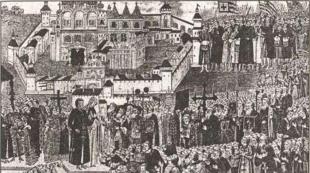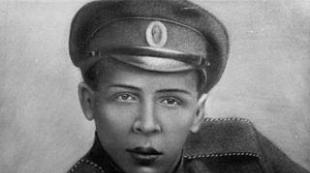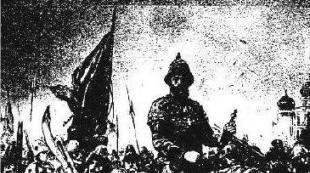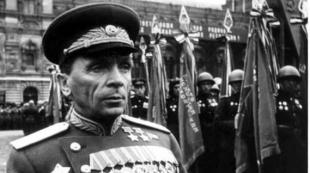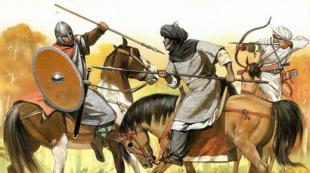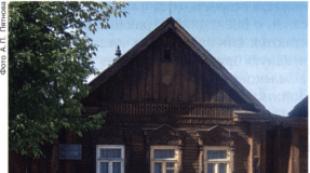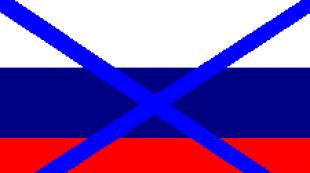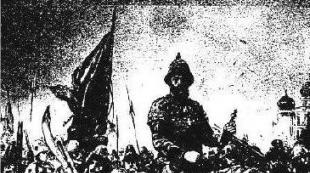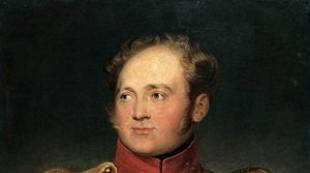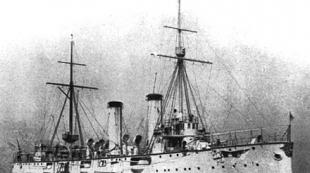Batov Pavel Ivanovich Pavel Batov
Central archive
Military Historical Library
Home Encyclopedia History of wars More
Batov Pavel Ivanovich
Batov Pavel Ivanovich, Soviet military figure and military leader. General of the Army (1955). Twice Hero of the Soviet Union (10/30/1943 and 06/02/1945).
Born into a peasant family. In military service since 1915. After graduating from the training team in 1916, he was sent to the front: private, corporal. After graduating in 1917 from the school of wartime ensigns, he became a junior non-commissioned officer with the rights of a volunteer of the 2nd category. During the February Revolution, he served as a junior non-commissioned officer in the 3rd Life Guards. Rifle regiment. Participated in battles near Riga, Molodechno, was wounded. For distinction in battles, he was awarded two St. George's crosses and two medals.
During the Civil War in August 1918, P.I. Batov was drafted into the Red Army and was appointed assistant platoon commander in the 1st Soviet Rifle Regiment. Since October of the same year, he was an assistant to the military leader at the Rybinsk military registration and enlistment office. Since October 1919 - assistant to the military head of the Reserve command staff of the Moscow Military District (MVO). In 1918-1919. participated in the suppression of the Yaroslavl and Borisoglebsk uprisings. From November 1919 - assistant commander and company commander of the Rybinsk Guard Battalion, from May 1920 - company and battalion commander of the 320th Infantry Regiment of the Moscow Military District. From January 1922, he served in the 18th Infantry Division of the same district: company commander in the 157th and 52nd Infantry Regiments, battalion adjutant, head of the regimental school. After graduating in 1927 from the advanced training courses for the command staff of the Red Army "Shot" named after. Comintern continued to serve in the division: battalion commander of the 53rd Infantry Regiment, Chief of Staff of the 52nd Infantry Regiment.
Since January 1932 - Chief of Staff, then commander of the 3rd Infantry Regiment of the Moscow Proletarian Infantry Division. From December 1936 to August 1937 P.I. Batov participated in the Spanish Civil War: a military adviser to the 12th International Brigade, then an adviser to the Teruel Front, was wounded. Upon his return, he was appointed commander of the 10th Rifle Corps of the Moscow Military District. From August 1938 - commander of the 3rd Rifle Corps. Member of the Soviet-Finnish war of 1939-1940. From April to November 1940 - Deputy Commander of the Transcaucasian Military District. In June 1940 he was awarded the military rank of lieutenant general.
Since the beginning of the Great Patriotic War, P.I. Batov - commander of the 9th Special Rifle Corps of the Odessa Military District. From August 1941 - Deputy Commander, and in November-December - Commander of the 51st Army of the Southern Front. In January 1942, he was first appointed commander of the 3rd Army of the Bryansk Front, and in February - assistant commander of the troops of this front. From October 1942 until the end of the war, P.I. Batov commanded the 65th Army, which fought as part of the Don, Stalingrad, Central, Belorussian, 1st and 2nd Belorussian Fronts. The troops under his command distinguished themselves in the battles of Stalingrad and Kursk, in the battle for the Dnieper, in the battles for the liberation of Belarus, in the Vistula-Oder, East Pomeranian and Berlin operations, liberated the years. Glukhov, Rechitsa, Mozyr, Bobruisk, Minsk, stormed Rostock and Stettin (Szczecin). The combat successes of the 65th Army under his leadership were noted 23 times in the orders of the Supreme Commander-in-Chief.
After the war, Colonel General P.I. Batov commanded the 7th mechanized army, from October 1946 - the 7th separate tank division. In 1950 he graduated from the VAK at the Higher Military Academy. K.E. Voroshilov. From March 1950 - Commander of the 11th Guards Army, from June 1954 - 1st Deputy Commander-in-Chief of the Group of Soviet Forces in Germany. From March 1955 - commander of the troops, first of the Carpathian military district, and from April 1958 - of the Baltic. From November 1959 - senior military specialist in the People's Liberation Army of China, from January 1961 - military inspector-adviser of the Group of General Inspectors of the USSR Ministry of Defense. From August 1961 - Commander of the Southern Group of Forces. Since September 1962 - 1st Deputy Chief of the General Staff - Chief of Staff of the Joint Armed Forces of the States Parties to the Warsaw Treaty Organization. Since October 1965 - in the Group of General Inspectors of the USSR Ministry of Defense. In 1970-1981. was chairman of the Soviet Committee of War Veterans. He was buried at the Novodevichy Cemetery in Moscow.
Awarded: in the Russian Empire - 2 St. George's crosses, 2 St. George's medals; USSR: 8 Orders of Lenin, Order of the October Revolution, 3 Orders of the Red Banner, 3 Orders of Suvorov 1st class, Orders of Kutuzov 1st class, Bogdan Khmelnitsky 1st class, Patriotic War 1st class, "For service to the Motherland in the Armed Forces of the USSR" 3rd class, "Badge of Honor", medals, as well as an Honorary weapon with a golden image of the State Emblem of the USSR; foreign orders: Great Britain - the British Empire 3rd class, Hungary - the Red Banner, GDR - "For Merit to the Fatherland" 1st class; Mongolian People's Republic - Sukhe-Bator and the Battle Red Banner; Poland - "Revival of Poland", "Virtuti Military" 2nd class, Grunwald Cross 2nd class; SRR - Tudor Vladimerescu 1st class, as well as many medals.
Born on June 1, 1897 in the village of Felisovo, Rybinsk district, Yaroslavl province, in a peasant family. In the autumn of 1908, he was hired as a "boy" in the fruit and gastronomic shop of the merchant Leonov in St. Petersburg. In 1915, as an external student, he took exams for 6 classes of a real school. During the First World War, he volunteered for the front, where he showed great ability as a commander of a reconnaissance squad. In 1917 returned to his native village after being seriously wounded.
In 1918 he volunteered to join the Red Army. Participated in the civil war as a red commander on the Eastern Front. After the war, in 1923, Batov was appointed head of the regimental school. Then - the commander of the Moscow Proletarian Division. In 1927 he graduated from the courses "Shot" and joined the ranks of the Communist Party.
Participated in the Civil War of the Spanish people in 1936-1939, in the entry of Soviet troops into Western Ukraine and Western Belarus in 1939, in the war with Finland in 1939-1940. During the Great Patriotic War, he was commander of a rifle corps, deputy army commander, assistant commander of the Bryansk Front.
From October 1942 P.I. Batov was appointed commander of the 65th Army, which was part of the Don Front. The army acted in the direction of the main blows: in the battles of Stalingrad, Kursk, on the Dnieper, they liberated Belarus, Poland, one of the first crossed the Oder, participated in the Berlin operation. For the skillful leadership of the army troops during the crossing of the Dnieper, the capture and retention of the bridgehead on its right bank and the courage and courage shown at the same time, on October 30, 1943, Lieutenant General Batov was awarded the title of Hero of the Soviet Union. Pavel Ivanovich was awarded the second Gold Star medal on June 2, 1945 for exemplary leadership of troops in the Belarusian operation, during the crossing of the Vistula, the assault on Danzig (Gdansk, Poland) and the capture of Stettin (Szczecin, Poland).
In 1950 graduated from the Higher Academic Courses at the Military Academy of the General Staff, commanded the troops of the Carpathian, Baltic military districts and the Southern Group of Forces. In 1962-1965. He was Chief of Staff of the Joint Armed Forces of the Warsaw Pact member states. In 1955 he was awarded the title of "General of the Army". Deputy of the Supreme Soviet of the USSR of several convocations. In 1970-1981. Pavel Ivanovich - Chairman of the Soviet Committee of War Veterans.
Since 1972 - Honorary citizen of Rybinsk, since 1983. - Yaroslavl region.
Awarded:
- eight orders of Lenin,
- Order of the October Revolution
- three orders of the Red Banner,
- three Orders of Suvorov I degree,
- Order of Kutuzov I degree,
- Order of Bohdan Khmelnitsky I degree,
- Order of the Badge of Honor,
- medals,
- honorary weapon,
- foreign orders.
“Hatred of an invader enemy is a sacred and most humane feeling. But it is born with such pain of the heart and torment of the soul that God forbid anyone experience it a second time ... "
Army General Pavel BatovGeneral Fritz, envied by Field Marshal Montgomery
What does great military leader mean? What meaning do people put into this phrase? How did the legendary Alexander the Great, in addition to his "blue blood", differ from his associates? How were the brains of the great Napoleon Bonaparte arranged in such a strategic-tactical way? How His Serene Highness Prince Golenishchev-Kutuzov thought, in order to forever remain in history a glorified commander. What is more in their fate: luck, advantageous positions or foresight and brilliant knowledge? And how are great military leaders born and is there something in common in their biographies, something that makes them outstanding figures in military operations?
There is a monument to Army General Pavel Ivanovich Batov in Rybinsk. How many of them were - the generals of the Second World War? Dozens, hundreds. Modern youth will remember several names: Zhukov, Rokossovsky, Rybalko ... And even then more by street names. But it was really a brilliant galaxy of military leaders, generals, commanders, for whose military glory, on May 9, veterans still raise a glass and drink it standing up.
Soldiers, as you know, are not born. Even more so with generals. What was so unusual about the fate of Pavel Batov that made him an army general, twice Hero of the Soviet Union? For which he first received two St. George's Crosses, and then eight Orders of Lenin (more than Marshal Zhukov), the Order of the October Revolution, three Orders of the Red Banner, three Orders of Suvorov, the Order of Kutuzov, Bogdan Khmelnitsky, the Patriotic War of the 1st degree, "For service to the Motherland in the Armed Forces of the USSR "of the third degree, not counting medals and foreign awards?

From non-commissioned officer to regimental commander
"... Love your people... Learn to serve them faithfully and truthfully, without prejudice."Army General Batov.
"The tiny village of Filisovo in the Upper Volga region, the poor family of a father who dreamed of a horse all his life." This is how Pavel Ivanovich Batov recalled his childhood.
He was the youngest son in a large peasant family, where every potato counted, and sugar was considered an unprecedented delicacy. Therefore, no one tried to keep Pavlusha when in the fall of 1908 he gathered "to the people." "People" turned out to be St. Petersburg merchants, the Leonov brothers. For five long years, Pavel dragged heavy boxes of Madeira and sacks of flour in their fruit and gastronomic trading house. And he dreamed of golden shoulder straps - the First World War was in full swing.
In the end, dreams were embodied in an escape to the front. The royal army did not immediately accept Paul. The very first officer he met on the way to military glory dissuaded: “Do not rush, you will have time to fight ...” But you will not escape fate. In 1915, Pavel was enrolled in a training team and went to the front in the Life Guards of the 3rd Rifle Regiment of the Guards Rifle Brigade.
On the Northern Front, the commander of the reconnaissance squad, Batov, received his first baptism of fire. And here his career as a combat junior non-commissioned officer ended. The raid into the German rear proved fatal. Taking the "language", the group came under heavy fire from the enemy.
The wound turned out to be severe, Pavel woke up already in the hospital. There they handed him the St. George Cross and a referral to study at the Peterhof School of Ensigns. By 1918, he already had the rank of ensign. And in the same year he voluntarily joined the Red Army and returned to his native village in the Rybinsk region.
About how Batov came to the recognition of the Bolsheviks, it is worth mentioning separately. It was in the tsarist army that Pavel met Savkov, a worker at the Putilov factory. Already after the Great Patriotic War, Pavel Ivanovich recalled: “Savkov, a Putilov worker in a soldier’s overcoat, was one of the dearest people for me. From him in 1916 he first heard the name Lenin and learned to understand why a Russian soldier had a rifle in his hands. Savkov, on his shoulders, carried me out, seriously wounded, when we went on a search. I… saw our dear Putilov on the last day of his life. It was already in the civil war. We took Shenkursk. The commissar of the rifle brigade Savkov was in the first line of attackers; there, near Shenkursk, a White Guard bullet caught him.
The Red Army accepted the hero of the First World War with open arms. The Bolsheviks were in dire need of young and experienced military men. And in the same 1918, Pavel Batov, being the commander of a machine-gun platoon of the 1st Soviet rifle regiment, already suppressed the actions against the Soviet power of the Romanovo-Borisoglebsky peasantry, counter-revolutionary rebellions in Rybinsk, Yaroslavl, Poshekhonye.
After success in defeating the rebellions, Batov was transferred as an assistant military leader for march formations at the Rybinsk military registration and enlistment office, and later as an assistant military leader of the Reserve of Command and Command Staff of the Moscow Military District. As part of the 320th Infantry Regiment, company commander Batov participated in the defeat of Wrangel's troops and the liberation of Crimea. In 1929, already a regiment commander, Batov joined the Communist Party. Here is an example of one testimonial given to a candidate member of the party: “Comrade Batov has been in command of the regiment for three years. All this time, the regiment ranks first in the division in all sections of combat and political training ... "
Batov went from company commander to regiment commander for almost 15 years. But it was these years that he considered the most important in his commanding career.
“Sometimes you have to watch,” he recalled after the war, “how quickly some officers grow in the service. He commands a platoon for a year, a company for half a year, a battalion for another year, and now give him a regiment. Such a commander resembles a man on stilts. It stands high, visible from afar, but there is no stability, since it is weakly connected to the ground.

Fritz Pablo - Hemingway's friend
“Do you know why all the Nazi soldiers were called Fritz during the war?
- It's a common name like Carl, David or Kurt.
- Don't guess. Let me explain. One of my favorite warriors, General Batov in the Spanish war, was encrypted and became Fritz Pablo. Journalists liked this German name. And they began to call every fascist Fritz. Batov was offended, but there was nothing he could do about it.”
From folklore
In October 1936, the commander of the Red Army regiment, Batov, arrived in Spain. Here he became Pablo Fritz. Pseudonyms were an indispensable attribute of the international brigades. Friends and associates of Batov wore the same nicknames, sometimes without any association with a real character: General Lukacs (Mate Zalku), Douglas (Aviation General Yakov Smushkevich), Pavlito (Alexander Rodimtsev, the future hero of Stalingrad), Basilio (Soviet military attache in the Spanish Republic of Gorev). The quite expected Nicholas (future Admiral Nikolai Kuznetsov) and Malino (future Marshal Rodion Malinovsky) stand out from this series.
Pablo - Pavel, but Fritz? Maybe because Batov looked like a typical German? Short, lean, ascetically built. One way or another, Batov gained fame in Spain under this operational pseudonym.
First, he was appointed as an adviser to the commander of the Republican Army brigade, one of the most talented military leaders of the anti-fascist war, Enrique Lister, and then was sent as an adviser to the commander of the 12th International Brigade, General Lukács, the famous Hungarian writer, hero of the Civil War, Mate Zalka.
There were fighters of seventeen nationalities in the Lukacs brigade - Germans, French, Hungarians, Russians ... Later, in his memoirs, Pavel Ivanovich wrote about his fellow internationalists: “One of the fighters, a Yugoslav anti-fascist, non-party worker Per, whom I met on the very first day upon arrival in Albacete, he said that he was arrested four times by the police: Austrian, Czech, Swiss and French - while he was getting to Spain. Two Romanians, railroad workers, the Burka brothers, were arrested three times. 20-year-old Polish youths Petren and Janek, workers in a cloth factory in Lodz, went all over Germany and France on foot to get to Spain. They had no money for the road, and the miserable pennies earned on daily work on the way went entirely to meager food. Still, the patriots achieved their goal. The English miners Anthony and George, as they were called in the brigade, traveled to Spain on three steamboats, having spent all their savings. Canadian miner Georg Fet enlisted in the United States of America as a stoker of a merchant ship, arrived at a French port and from there on foot came to Spain. Neither difficulties nor dangers broke the morale of the volunteers. Listening to their stories, it was impossible not to be proud of the solidarity of the working people of all countries.
In 1937, an artillery shell hit the car of General Lukács. The general was killed, political commissar Fritz Pablo was seriously injured.
For his courage in Spain, Pavel Batov was awarded the Orders of Lenin and the Red Banner.
There are many legends and stories about Batov. Here is one of them, connected with Spain and capable of shedding light on the character of the general.
Batov's personal driver in Spain was Semyon Poberezhnik. Many years later, recalling his driver, the general writes: “In my life as a professional military man who participated in six wars, there were many interesting meetings with a variety of people who have long been remembered. But I especially remember a man of unusual fate, a Bukovinian peasant, a grain grower by vocation, who passionately loves the land, Semyon Yakovlevich Poberezhnik. He saved my life by taking the seriously wounded out of the battle ... "
At one time, Semyon traveled the whole world in search of a better life: he was a sailor on a Belgian bulk carrier, a cook in Paris, and worked for Ford in America. Knew five languages. This circumstance became decisive when GRU adviser Khadzhi-Umar Mamsurov, who was in Spain under the pseudonym "Xanthi", suggested Poberezhnik to enter the intelligence school. Pavel Batov gave a recommendation to his driver.
The first "business trip abroad" was Italy, where the intelligence officer-informant collected information about the combat composition of the Italian navy. Then he was sent to Bulgaria. Alfred Joseph Mooney, as they began to call him then, radioed to Moscow about the meeting of the Bulgarian Tsar Boris with Hitler, about the secret visit to Sofia by Admiral Canaris ... When Poberezhnik returned to Moscow, he was accused of betrayal. Investigators prepared an indictment. By a special meeting at the NKVD of the USSR on September 8, 1945, Semyon Poberezhnik was sentenced to 10 years in camps and 2 years of residence in a special settlement.
Having fully served his term, Poberezhnik found Batov. And the general forced the authorities to reconsider the intelligence officer's case. As a result, Semyon Poberezhnik received a new “clean” passport, in accordance with the legislation that existed in those years, he was paid two salary salaries and was solemnly awarded medals: “Participant in the National Revolutionary War in Spain 1936-1939”, a Polish medal “ For our and your freedom”, Italian medal named after Giuseppe Garibaldi, Order of the Patriotic War II degree.
The general also made new friends in Spain. Front cameraman Roman Karmen, with whom he liked to remember the Spanish events after the war. AND…
Ernest Hemingway. Some sources claim that it was Batov who became the prototype of General Goltz in the novel For Whom the Bell Tolls.

Beat the enemy with art
“... Rokossovsky introduced Batov to Montgomery: “This is the same general who first crossed the Oder and opened the door to Berlin.” The Englishman looked at Batov intently, shook his hand for a long time and suddenly asked: “Are you by any chance a relative of Suvorov? I know history well and have seen his portraits. Your resemblance to the generalissimo is striking: short, thin and exactly the same tuft on the back of his head ... ". “Almost guessed it, sir,” Rokossovsky laughed, “my soldiers call Batov - our Suvorov.”
From the memoirs of Vyacheslav Lukashin
After Spain, Batov received command first of the 10th, then the 3rd rifle corps, participated in the liberation of Western Belarus and in the Soviet-Finnish war in 1939-1940. For the battles on the Karelian Isthmus he was awarded the Order of Lenin. He was awarded the military rank of brigade commander. Batov met the beginning of the Great Patriotic War as the commander of the 9th separate rifle corps. In August 1941, he was transferred to the post of deputy commander of the 51st Army, which defended the Crimea.
Army formations under the command of Batov took an active part in the Kerch-Feodosia landing operation. And on November 19, 1941, after the evacuation of the army from the territory of Crimea, Pavel Ivanovich became its commander.
In January 1942, Batov received command of the 3rd Army of the Southwestern Front, then the Bryansk Front. For more than six months, Lieutenant General Batov served as assistant to the front commander, General Rokossovsky. He held this position during the most difficult defensive battles of the Battle of Stalingrad.
Here is what Marshal of the Soviet Union Konstantin Rokossovsky writes in his memoirs: “Somehow, while in the 65th Army, in a friendly conversation over a cup of tea, I reminded Pavel Ivanovich Batov of our telephone conversation. And this was during the heavy December battles, when we were urgently required to defeat the newly encircled enemy as quickly as possible, but we did not have enough forces and means for this. Calling Batov to the phone, I asked how the offensive was developing.
“The troops are advancing,” was the reply.
- How are they progressing?
- They crawl.
- Have you crawled far?
- To the second horizontal of the Cossack barrow.
Despite the annoyance that I experienced from such answers, I was laughed out loud. Understanding the condition of the army commander and the current situation, I told him: since his troops were forced to crawl and they managed to get only to some imaginary horizontal line, I order you to stop the offensive, withdraw the troops to their original position and go on the defensive, conducting power reconnaissance in order to keep the enemy in suspense".
And here is how Pavel Ivanovich himself talks about the same situation: “... In the meantime, a small operation was organized on the right flank of the army. Checking the readiness for the offensive, the front commander ordered the Five Kurgans to be cleared of the enemy. This case was entrusted to the divisional commander V.S. Askalepov. The 173rd went into battle well. In the evening Askalepov reported: "One mound has been taken." Ivan Semyonovich (chief of staff) sent a report about this to the front headquarters with a sense of satisfaction. On the second day Askalepov reported: "The second barrow has been taken." Very good! .. On the third day, Rokossovsky called me to the phone and asked with icy politeness, in a slightly vibrating voice:
— Pavel Ivanovich! I ask you to inform me how many mounds you are going to take at the level of one hundred and thirty-five zero?
The chief of staff looked at me sympathetically:
Looks like they've made history! Have you seen these mounds yourself?
... In a word, no burial mounds were found. They existed only in the name of the skyscraper. Fortunately, the offensive began, and the “hunting” stories of the division commander of the 173rd ended safely, without penalty ... "
... During the operation during the Battle of Stalingrad, called the "Ring", Batov for the first time used the method of artillery support for an attack with a single fire shaft - in the offensive zone, Soviet troops managed to create a concentration of artillery and mortars exceeding 200 units per kilometer of the front. This tactic has since become widespread. For the operation "Ring" Pavel Ivanovich Batov was awarded the Order of Suvorov, I degree.
After the end of the battle on the Volga, the troops of the 65th Army were transferred to the Central Front. In the Chernigov-Pripyat operation, advancing in the direction of the main attack, Batov's army broke through the enemy's defenses, launched an offensive and captured important bridgeheads on the western bank of the Sozh River, then crossed the Dnieper, cut the strategic railway supply lines of German troops in the Gomel region.
For "organization of a clear interaction of subordinate troops during the crossing of the Dnieper, a strong hold on the bridgehead on the western bank of the river and personal courage and courage shown at the same time," by the Decree of the Presidium of the Supreme Soviet of the USSR, Lieutenant-General Pavel Ivanovich Batov was awarded the title of Hero of the Soviet Union with the Order of Lenin and a medal "Golden Star".
Fellow soldiers recall that the commander Batov was distinguished by the ability to foresee the development of events and make informed decisions. He was a supporter of new, unexpected methods of warfare. Batov carefully analyzed the features of the combat situation, determined the strengths and weaknesses of the enemy, made an accurate calculation, and only then made a decision. He said: "We must beat the enemy with art, which means - with little bloodshed."
So, during the Bobruisk operation in 1944, on the initiative of Batov, a double barrage of fire was used to a depth of two and a half kilometers in a narrow six-kilometer section of the breakthrough to support the attack of infantry and tanks. Following a powerful strike by aviation, artillery and rifle corps, the 1st Guards Tank Corps was brought into the battle. This allowed Batov's army to advance up to two hundred kilometers in the Slutsk direction, inflict a heavy defeat on the enemy, and create conditions for a further offensive. For the successful conduct of this operation, Pavel Ivanovich was awarded the military rank of colonel general, the Order of Kutuzov, 1st degree, and a gold watch from the High Command.
In January 1945, the army went on the offensive in Eastern Pomerania, participated in the liberation of the cities of Gdynia and Danzig. Then there was an offensive on Stettin and access to the coast of the Baltic Sea in the Rostock region.
On June 2, 1945, Colonel-General Batov was awarded the second Gold Star medal by the Decree of the Presidium of the Supreme Soviet of the USSR "for the initiative and courage shown in organizing the crossing of the Oder River and the capture of the city of Stettin".
“Few people know,” says the head of the Institute of Military History, General Pavel Zhilin, “but the first to break into Berlin and capture Hitler was the dream of British Field Marshal Montgomery. Because of this, he even quarreled with General Eisenhower. However, Batov confused the cards for one and the other ... ". The commander was the first to cross the Oder and opened the way for our troops to Berlin.

Knight Commander
"The battle carried out twice - first in thoughts, and then in actions.
Army General Pavel Batov
“General Batov was not just a major military leader, he was a military theorist. Military historians are studying and will continue to study the operations carried out by the general's troops. He wrote many articles, studies and memoirs. But in all his works there was one drawback: he spoke in detail and in detail about tactics, people, and almost nothing about himself.
“He was closely connected with the troops, knew his subordinates very well, appreciated them, and the subordinates loved their commander for courage and fearlessness, for humanity and spiritual generosity ...” - this is how his colleague Colonel Laskin recalled Batov. And it is no coincidence that Marshal of the Soviet Union Rokossovsky noted in his memoirs that he knew only two major military leaders whom his subordinates not only respected, but also sincerely loved - Ivan Chernyakhovsky and Pavel Batov.
“He was a cruel man who sent a penal battalion to the minefields to reduce the losses of his army. For him, the death of a hundred or so penalized soldiers is a trifle compared to the victims of poor intelligence of the 65th Army.
“He questioned the participation of Stalin and Khrushchev in the fighting of the Battle of Stalingrad. When a meeting was held in Moscow on the occasion of the anniversary of the defeat of the enemy near Stalingrad, at the end of the official part, one officer turned to the general who was there with the question: “Comrade General, please tell me, was Stalin in Stalingrad when the famous battle was going on?” There was a pause, then Batov said: "I don't know." The officer again turned to Batov: “Comrade General, was Khrushchev in Stalingrad?” Another pause, then the answer follows: "I don't know." But he knew that he was telling a lie.”
... Like any strong and integral personality, Batov is complex and contradictory. And the attitude towards him cannot be unambiguous. It is not for us, the inhabitants of the 21st century, to judge a military leader who made decisions in an extreme military environment. One thing is clear: Batov was an outstanding tactician of military operations, whose merits are recognized by his comrades-in-arms and appreciated by historians. And whose biography did not end with the First World, Civil, Spanish, Finnish, Second World Wars.
After the war, Pavel Ivanovich Batov commanded mechanized and combined arms armies, was the first deputy commander in chief of the Group of Soviet Forces in Germany.
In 1950 he graduated from the Higher Academic Courses at the Military Academy of the General Staff. In 1955 he was awarded the military rank of General of the Army. Until 1962, Batov commanded successively the Carpathian Military District, the Baltic Military District, and the Southern Group of Forces.
In 1962, Batov was appointed Chief of Staff of the Joint Armed Forces of the Warsaw Pact member states. From 1965 until the end of his life he worked in the Group of General Inspectors of the USSR Ministry of Defense. And from 1970 to 1981 he was chairman of the Soviet Committee of War Veterans.
His face is well known to the post-war generation from television appearances. And Rybinsk remembers his meetings with veterans and schoolchildren.
Pavel Batov is an honorary citizen of Rybinsk, the Yaroslavl region, the cities of Novgorod-Seversky, Loeva, Rechitsa, Ozerka, Polish Gdansk and Szczecin. The publication "Independent Military Review" puts him in second place among the commanders of combined arms armies. And the King of Great Britain George VI for the Battle of Stalingrad awarded him the highest order of the British Empire with the title of "Knight Commander".
Army General Batov died on April 19, 1985 and was buried in Moscow at the Novodevichy Cemetery.
... The battle is carried out twice - said General Batov. This, probably, is a common feature of the famous commanders - the ability to predict the actions of the enemy and take into account every little thing in the upcoming battle. And only then engage in a real battle.
(06/01/1897 - 04/19/1985) - Army General, twice Hero of the Soviet Union
Pavel Ivanovich Batov was born in 1897 into a poor peasant family in the village of Filisovo (now the Rybinsk district of the Yaroslavl region).
In 1916, Pavel Batov began serving in the Russian army. He participated in the First World War and for distinction in battles he was awarded the St. George crosses, two medals, promoted to non-commissioned officer and sent to study at the Peterhof school of ensigns. By 1918, he already had the rank of ensign. In the same year he voluntarily joined the Red Army. During the civil war, as an assistant to the military head of the Rybinsk military registration and enlistment office, Batov prepared reserves for the army. Later he became head of the regimental school, commanded a company.
In 1927, Pavel Ivanovich graduated from the "Shot" courses and received the post of battalion commander in the 3rd Infantry Regiment of the 1st Moscow Infantry Division, and then became the commander of this regiment. In 1929 he joined the party.
In all his posts, Batov showed enviable organizational skills. By the early 1930s, he had matured into an excellent military commander. For the skillful training and education of personnel in 1935, he was awarded the Order of the Badge of Honor.
In 1936, after graduating from the Military Academy. MV Frunze Pavel Ivanovich Batov went to Spain as a volunteer. He fought in the 12th International Brigade under General Lukács and was wounded twice. Batov was awarded the Orders of Lenin and the Red Banner.
Upon returning to his homeland, Batov received command first of the 10th, then the 3rd rifle corps. Together with the corps, he participated in the liberation of Western Belarus and in the Soviet-Finnish war in 1939-1940. For the battles on the Karelian Isthmus, Pavel Ivanovich was awarded the Order of Lenin. He was awarded the military rank of brigade commander. In 1940, he was appointed First Deputy Commander of the Transcaucasian Military District.
Batov met the beginning of the Great Patriotic War as the commander of the 9th separate rifle corps. In August 1941, he was transferred to the post of deputy commander of the 51st Army, which was defending in the Crimea. In October, during the Crimean defensive operation, Batov was appointed deputy commander of the Crimean troops for the ground forces, leaving him with the post of deputy commander of the 51st Army. Formations of the 51st Army under the command of Batov took an active part in the Kerch-Feodosiya landing operation. And on November 19, 1941, after the army was evacuated from the territory of Crimea, he became its commander.
In January 1942, Pavel Ivanovich Batov received command of the 3rd Army of the Southwestern Front, then the Bryansk Front. For more than six months, Lieutenant General Batov served as assistant to the front commander, General Rokossovsky. He held this position during the most difficult defensive battles of the period of the Battle of Stalingrad until October 14, 1942, when he was appointed commander of the 4th Panzer Army.
On October 22, 1942, by order of the Headquarters of the Supreme Commander-in-Chief, the 4th Tank Army was renamed the 65th Army. From that time until the end of the Great Patriotic War, its permanent commander was General Pavel Ivanovich Batov, under whose leadership the army went through the battle path from Stalingrad to East Prussia and Rostock.
The newly formed 65th Army became part of the Don Front. Occupying the right flank of the front, closely interacting with the troops of the Southwestern Front, she fought defensive battles, while preparing for the offensive.
On November 19, 1942, the 65th Army went on the offensive, occupying the left flank of the strike group advancing north of Stalingrad. As a result of a powerful blow, the enemy defenses were broken through. The successful actions of the army formations allowed the main part of the advancing grouping, without stopping to strengthen the flanks, to join with the advancing units of the Stalingrad Front. After the encirclement of the 6th field and part of the 4th tank armies, the 65th army of Batov by November 30 closed the inner ring of encirclement, uniting with the troops advancing towards it. During the operation to defeat the encircled enemy grouping, called the "Ring", Batov for the first time used the method of artillery support for an attack with a single fire shaft - in the offensive zone, Soviet troops managed to create a concentration of artillery and mortars exceeding 200 units per kilometer of the front. This tactic has since become widespread. For this operation, Pavel Ivanovich Batov was awarded the Order of Suvorov, I degree.
After the end of the battle on the Volga, the troops of the 65th Army were transferred to the newly formed Central Front and occupied its left flank. The formations under the command of Batov became part of the forces intended for the offensive in the Bryansk direction. In extremely difficult conditions, having entered the battles literally from the wheels, the troops of the 65th Army were forced to leave Sevsk and go on the defensive on the northwestern face of the Kursk salient. Throughout the spring, they were engaged in strengthening the defense. During the Battle of Kursk, the 65th Army occupied its positions, conducting positional battles, not participating in the main defensive and offensive battles. At the same time, the army commander was preparing subordinate formations for the next offensive operations.
The first of these was the Chernigov-Pripyat operation, carried out by the troops of the Central Front. The 65th Army, advancing in the direction of the main attack, breaking through the enemy defenses, launched an offensive and captured important bridgeheads on the western bank of the Sozh River. Ten days later, formations of the 65th Army launched a new offensive as part of the Gomel-Rechitsa operation. Advancing on the left flank of the 1st Belorussian Front, they crossed the Dnieper, cut the strategic railway supply lines of the German troops in the Gomel region.
For the organization of clear interaction between subordinate troops during the crossing of the Dnieper, the strong holding of a foothold on the western bank of the river and the personal courage and courage shown at the same time, by the Decree of the Presidium of the Supreme Soviet of the USSR, Lieutenant-General Pavel Ivanovich Batov was awarded the title of Hero of the Soviet Union, with the Order of Lenin and a medal " Golden Star".
As a commander, Batov was distinguished by inexhaustible energy, the ability to foresee the development of events and make correct and informed decisions. He was always a supporter of new methods of warfare that were unexpected for the enemy. Each time, when choosing methods for defeating the enemy, Batov proceeded from specific conditions, carefully analyzed the features of the combat situation, determined the strengths and weaknesses of the enemy, made an accurate calculation and made the right decision. He said: "We must beat the enemy with art, which means little bloodshed." So, during the Bobruisk operation in 1944, the 65th Army, which is part of the 1st Belorussian Front, operated in the southern shock group. On the initiative of Batov, a double barrage was used to a depth of 2.5 km in a narrow six-kilometer section of the breakthrough to support the attack of infantry and tanks. Following a powerful strike by aviation, artillery and rifle corps, the 1st Guards Tank Corps was promptly brought into the battle. The precise implementation of the plans of the front command, interaction with neighbors along the front allowed the 65th Army to advance up to 200 km in the Slutsk direction, inflict a heavy defeat on the opposing enemy units, and create conditions for further offensive operations. For the successful conduct of this operation, Pavel Ivanovich was awarded the military rank of colonel general, the Order of Kutuzov, 1st degree, and a gold watch from the High Command.
Further, the troops under the command of General Batov advanced in the direction of Brest. Overcoming water barriers, striking at the retreating enemy and not allowing him to gain a foothold on new lines, by the end of August, the 65th Army entered the areas north of Warsaw. In two months of fighting, she traveled almost 600 km.
At the beginning of 1945, formations of the 65th Army were transferred to the 2nd Belorussian Front, commanded by Rokossovsky, who had previously headed the 1st Belorussian Front.
Given the stubborn resistance of the enemy in East Prussia, formations of the 2nd Belorussian Front were sent there. In January 1945, the 65th Army, being on the left flank of the front, after heavy fighting, went on the offensive in Eastern Pomerania. As part of the main strike force, she participated in the liberation of the cities of Gdynia and Danzig.
After the completion of the operation in Pomerania, formations of the 2nd Belorussian Front were hastily transferred to the west. The 65th Army took up positions south of Stettin. On April 20, 1945, she went on the offensive, and again as part of the shock group of the 2nd Belorussian Front. Crossing the Oder on the move, the 65th Army broke through the defensive lines in the Stettin area and, with the support of units of the 1st Guards Tank Corps, launched an offensive in a north-western direction, reaching the coast of the Baltic Sea in the Rostock area by early May.
On June 2, 1945, Colonel-General Batov, by the Decree of the Presidium of the Supreme Soviet of the USSR, was awarded the second Gold Star medal for the initiative and courage shown in organizing the crossing of the Oder River and capturing the city of Stettin.
The combat successes of the 65th Army under the leadership of Batov were noted 23 times in the orders of the Supreme Commander-in-Chief. Her military merits were highly appreciated: 43 units and formations received honorary titles; the combat banners of the army units were crowned with 102 orders; 304 soldiers became Heroes of the Soviet Union.
After the war, Pavel Ivanovich Batov commanded mechanized and combined arms armies, was the first deputy commander in chief of the Group of Soviet Forces in Germany.
In 1950 he graduated from the Higher Academic Courses at the Military Academy of the General Staff. In 1955 he was awarded the military rank of General of the Army. Until 1962, Batov commanded the troops of a number of military districts: from 1955 to 1958 - the Carpathian Military District, from 1958 to 1959 - the Baltic, from 1959 to 1962 - the commander of the Southern Group of Forces.
In 1962, Pavel Ivanovich Batov was appointed Chief of Staff of the Joint Armed Forces of the Warsaw Pact member states. From 1965 until the end of his life he worked in the Group of General Inspectors of the USSR Ministry of Defense. Between 1970 and 1981 he was chairman of the Soviet Committee of War Veterans.
His merits during the war years and in peacetime were awarded eight Orders of Lenin, the Order of the October Revolution, three Orders of the Red Banner, three Orders of Suvorov I degree, orders of Kutuzov I degree, Bogdan Khmelnitsky I degree, Patriotic War I degree, orders "For Service to the Motherland in the Armed Forces of the USSR ”and“ Badge of Honor ”, many medals, honorary weapons and orders of other states.
Army General Batov died on April 19, 1985. He was buried in Moscow at the Novodevichy Cemetery.
Yu.N. Lubchenkov. 100 Great Commanders of World War II
B ATOV Pavel Ivanovich (May 20 (June 1), 1897, Filisovo village, Rybinsk district, Yaroslavl province - April 19, 1985, Moscow) - twice Hero of the Soviet Union (1943, 1945), army general (1955).
Born into a poor peasant family. Russian. He graduated from a two-year rural elementary school. From the age of 13 he lived in St. Petersburg, worked as a loader and peddler, and was engaged in self-education. Externally passed the exams for 6 classes.
In November 1915, he volunteered for the Russian Imperial Army. He served in the Life Guards of the 3rd Infantry Regiment of the Guards Rifle Brigade. Member of the 1st World War since 1916 on the Northern Front, commander of the intelligence squad, was wounded. For distinction in battles he was awarded two St. George's crosses and two medals. In 1917 he graduated from the team in preparation for admission to the Peterhof school of ensigns. He had the rank of junior non-commissioned officer.
In the Red Army since 1918. During the Civil War, he was the commander of a machine-gun platoon, assistant military leader for march formations at the Rybinsk military enlistment office, assistant military leader of the Reserve command and command staff of the Moscow Military District. Participated in the suppression of counter-revolutionary actions and rebellions in Rybinsk, Yaroslavl, Poshekhonye. From 1919 he was assistant commander and commander of a rifle company.
In 1927 he graduated from the Shooting and tactical advanced training courses for the commanders of the Red Army "Shot" named after the Comintern. Since 1924 he commanded a battalion. Member of the CPSU (b) since 1929. Since 1931 - Chief of Staff of the regiment. From 1934 he commanded a rifle regiment in the 3rd Moscow Proletarian Rifle Division of the Moscow Military District. In December 1936 - August 1937, under the pseudonym Pablo Fritz, he participated in the national revolutionary war of the Spanish people as a military adviser to the 12th International Brigade and adviser to the commander of the Teruel Front.
Upon his return, from August 1937 - commander of the 10th Rifle Corps, from August 1938 - commander of the 3rd Rifle Corps. In 1939-1940, he participated in the Soviet-Finnish war, commanded the 3rd (from December 13, 1939) and Special (from March 6, 1940) rifle corps as part of the 13th Army on the Karelian Isthmus. From April to November 1940, he was deputy commander of the Transcaucasian Military District, then commanded the 9th Special Rifle Corps in the Crimea, and on June 20, 1941, he was simultaneously appointed commander of the ground forces in the Crimea.
From the beginning of the Great Patriotic War, P. I. Batov was the commander of the 9th Special Rifle Corps in the Crimea, from August 1941 he was the deputy commander of the 51st Army of the Southern Front, a participant in defensive battles at Perekop and in the Kerch region. In November-December 1941, he commanded the 51st Army of the Transcaucasian Front (it was being reorganized on the Taman Peninsula). In January - February 1942 - commander of the 3rd Army of the Bryansk Front. From February to October 1942, he served as assistant commander of the Bryansk Front for formation (approved in it only in September). From October 14 to October 23, 1942 - commander of the 4th tank army, which was then renamed the 65th army.
As commander of the 65th Army, P.I. Batov fought until the end of the war as part of the Don, Stalingrad, Central, Belorussian, 1st and 2nd Belorussian fronts. The troops under the command of P. I. Batov in the Battle of Stalingrad heroically defended themselves north of Stalingrad on the Don, and then distinguished themselves during the encirclement and destruction of the 6th German army in Stalingrad. In February - March 1943, the army fought heavy offensive and defensive battles in the Sevsk direction. In the Battle of Kursk, she actively acted in the defensive operation of the Central Front. In the battle for the Dnieper in August - September 1943, the 65th Army rapidly advanced 300 kilometers in a month with battles, crossed the Desna, Sozh, Dnieper rivers, liberated the cities of Sevsk, Glukhov and Loev, fought heroically on the Dnieper bridgeheads.
By decree of the Presidium of the Supreme Soviet of the USSR of October 30, 1943, Lieutenant General Pavel Ivanovich Batov "h and the successful forcing of the Dnieper River, the solid consolidation of the bridgehead on the western bank of the Dnieper River and the courage and heroism shown at the same time, was awarded the title of Hero of the Soviet Union with the Order of Lenin and the Gold Star medal.
In the winter campaign of 1943-1944, the troops of P. I. Batov again distinguished themselves in the Gomel-Rechitsa and Kalinkovichi-Mozyr offensive operations. The commander of the 65th Army, P. I. Batov, skillfully used a double fire shaft to support the attack of infantry and tanks in 1944 in the Bobruisk operation, played a decisive role in the destruction of the Bobruisk grouping of the enemy (up to 40,000 people), resolutely maneuvered the army troops from one directions to another in further battles of the Belarusian strategic operation, distinguished himself in the defeat of enemy troops north of Brest, in crossing the Western Bug River, in capturing and holding strategically important bridgeheads in the Serotsk area. In the East Prussian operation, the 65th Army distinguished itself in the defeat of the 2nd and 4th German armies in the Mlavsky and Allenstein fortified areas, then successfully advanced in the East Pomeranian operation. In the Berlin offensive, Batov's army crossed the Oder and occupied large areas in northern Germany, liberating the cities of Rostock and Stettin. For this operation, he was presented for the second Golden Star award.
Decree of the Presidium of the Supreme Soviet of the USSR of June 2, 1945 "h and the exemplary performance of the combat missions of the Command on the front of the fight against the German invaders ”Colonel General Pavel Ivanovich Batov was awarded the second Gold Star medal.
In the course of numerous military operations, he proved to be a decisive, energetic military leader. The combat successes of the 65th Army under the leadership of P.I. Batov were noted 23 times during the war years in the orders of the Supreme Commander-in-Chief.
After the war, he commanded the 7th mechanized army, from October 1946 - the 7th separate tank division. In 1950 he graduated from the Higher Academic Courses at the Higher Military Academy named after K. E. Voroshilov (then the Military Academy of the General Staff). Since March 1950 - Commander of the 11th Guards Army, since June 1954 - First Deputy Commander-in-Chief of the Group of Soviet Forces in Germany. In March 1955 he was appointed commander of the Carpathian military district. From April 1958 he commanded the troops of the Baltic Military District.
Since November 1959, P. I. Batov has been a senior military adviser in the People's Liberation Army of China. In January 1961, he was sent to the honorary position of military inspector-adviser of the Group of General Inspectors of the USSR Ministry of Defense. But he was soon returned to command work and in August 1961 he was appointed commander of the Southern Group of Forces in Hungary. Since September 1962 - First Deputy Chief of the General Staff of the Armed Forces of the USSR - Chief of Staff of the Joint Armed Forces of the states - participants of the Warsaw Pact. Since October 1965, again a military inspector-advisor of the Group of General Inspectors of the USSR Ministry of Defense.
In 1970 - 1981 - Chairman of the Soviet Committee of War Veterans. Deputy of the Supreme Soviet of the USSR of the 1st, 2nd, 4th-6th convocations (1938-1950, 1954-1966).
He was awarded eight Orders of Lenin (07/04/1937; 03/11/1940; 10/30/1943; 02/21/1945; 05/31/1957; 05/31/1967; 05/31/1977; 05/31/1982), the Order of the October Revolution (05/31/1972), the Order of the October Revolution (05/31/1972), three orders of the Banner (01/03/1937; 11/03/1944; 06/20/1949), three orders of Suvorov 1st degree (01/28/1943; 09/16/1943; 04/10/1945), orders: Kutuzov 1st degree (07/23/1944), Bogdan Khmelnitsky 1st degree (02/18/1956), Patriotic War 1st degree (03/11/1985), "For service to the Motherland in the Armed Forces of the USSR" 3rd degree (04/30/1975), "Badge of Honor" (05/14/1936 ), medals of the USSR, Honorary weapons with the golden coat of arms of the USSR (02/22/1968).
Awarded with foreign orders: the Commander's Cross of the Order of the British Empire (Great Britain), the Order of Military Valor (Poland), the Order of the Cross of Grunwald 2nd Class (Poland), the Order of the Revival of Poland, two orders of the People's Republic of Bulgaria, the Order of Tudor Vladimirescu ( Romania), Order of the Red Banner (Hungary), Order of Sukhbaatar (Mongolia), Order of the Red Banner (Mongolia), Order of Merit for the Fatherland in gold (German Democratic Republic), medals of Poland.
Military ranks: colonel (1936), brigade commander (8/8/1937), division commander (11/4/1939), lieutenant general (06/4/1940), colonel general (June 29, 1944), army general (03/10/1955).
Honorary citizen of the Yaroslavl region (1983), the cities of Rybinsk, Yaroslavl region (1972), Kalach-on-Don, Volgograd region (1972), Zheleznogorsk, Kursk region (1981), Novgorod-Seversky, Chernigov region of Ukraine, Bobruisk, Mogilev region, Loev, Rechitsa, Kalinkovichi and Svetlogorsk, Gomel region of Belarus.
A bronze bust of twice Hero of the Soviet Union P.I. Batov was installed in the city of Rybinsk. A museum has been created in his homeland in the village of Filisovo. The bust of Batov is installed in the regional center of Belarus - the city of Gomel. Streets in Volgograd, Yaroslavl, Rybinsk, Svetlogorsk are named after the outstanding military leader. In Moscow, on the house where he lived, a memorial plaque was erected.
